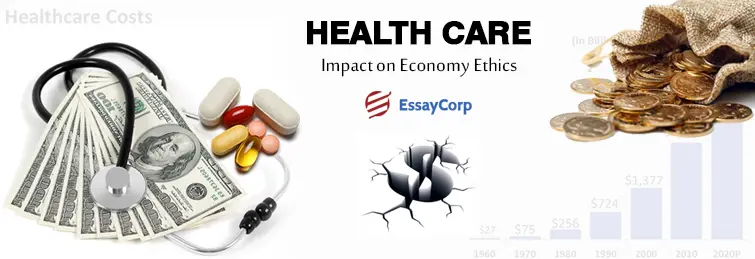The burden of health care has been growing on the economy of the US for several decades now. This has drawn substantial attention to the situation and the cause of this rise in spending. After careful examination, the factors that contributed to were identified were population demographics, medical technology advancements, price inflation, and changes in health care utilization. There is a direct causal relationship between the US economy and the health care expenditure. Experts have suggested that if measures are not taken to curtail this rise, soon, this aggregate rise will pose a decline in the economic growth and employment.
How Does Health Care Affect the Economy?
A study done of the CEO’s in the US concluded that majority of the business leaders were concerned about the cost associated with the health care of staff. The effects of rising healthcare costs also pose trouble for the federal budget.
It is not all glum when it comes to health care; some economists view this as a good sign. When put in the context of the quality, the cost of health care is decreasing and more and more people can have access to new medical technologies. At the local level, the rising health care cost is beneficial as it creates more jobs for the residents, increased wage of healthcare professionals, and surge in tax revenue.

Impact of the Economy on Health Care
It must be clear by now that health care and the US economy are both interlinked. It is sometimes even said that health care is the economy. It employs a large number of people; some of the impact on economic health care are listed below.
- Reduced Funding – The primary objective of any private hospital is to increase the profit and make the shareholders happy. This has very inverse effect on the staff of the hospital, the patients and the general public. There is a shortage of funds coming in from all sources like the government, public or private sector.
- More Uninsured Families – Due to the rise in unemployment, the number of uninsured families have increased as these families have lost their insurance funded by the employer. And many of these families cannot maintain their own insurance. The hospitals and the insurance companies are out to make profit and they would not provide coverage for a pre-existent disease. This leaves the children’s vulnerable to illness. And as the rate of unemployment increases, this situation is about to get worst.
- Rise In Obesity Rate – We have never been more informed about obesity and yet, the rate of obesity keeps on rising. It is estimated that every child out of three children is obese in the United States. There are several diseases like diabetes, high cholesterol, high blood pressure, heart attack, stroke, and cancer that are caused due to obesity. It puts immense strain on the health care system.
- Staff Shortage – Due to the lack of funding, doctors and nurses are in short supply and those who are there have to do overtime because of which they get exhausted and due to this the quality of patient care diminishes. This can be catastrophic as there is not enough time for the doctors to do a proper examination. Hundreds of people die every year because of this and the hospitals are inconspicuous about it.
- Control Of Pharmaceutical Companies – The final economic issue affecting healthcare is the costly medicines. The pharmaceutical companies are responsible for inventing new cure of persistent diseases, but they have gotten greedy and are escalating the price of drugs making it inaccessible to those with feeble financial conditions.

Health Care Percentage of Economy
In a 2003 study, it was found that the total spending on health care rose to $1.7 trillion or $5670 per person. In 1960, the national health expenditure was $27 billion, this number rose to $427 billion in just about two and a half decades in the year 1985 and 10.1% of the GDP. Another two decades and it’s come closer to $2 trillion, far more than the GDP of most of the countries. It was projected that the national health expenditure is expected to touch $3.4 trillion by the year 2013 and its share in the GDP would be 18.4%.

The growing share of health care expenditure and the stagnant economic growth poses severe problems for the economy as more funds will go to health care expenditure than any other thing and this will have a negative impact on the public and private sectors. In the short-run, health care can create jobs, but it will have an adverse effect in the future. Therefore, efforts must be made to eliminate the unnecessary elements that increase the expenditure.



